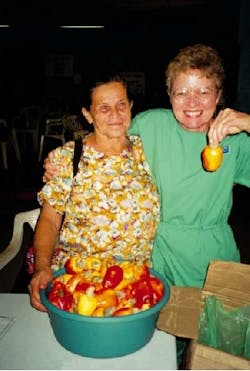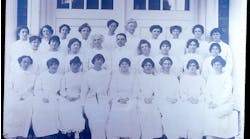It must be love. How else can you explain dental and medical professionals leaving their families, spending their own money for airfare and ship passage to a Third World country, and volunteering their professional services to help provide dental and medical care, for weeks or even months at a time? Such compassion for fellow man is rather unusual ... or is it?
Beverly Cavera, RDH, RN, is a crew-member volunteer on the Mercy Hospital ship MV Caribbean Mercy, which tours Central America. Cavera began her journey with a tour of the ship. "Every year, the ship comes to a different port for public relations, to raise money, and to recruit volunteer personnel," she said. "I had applied to be on a ship right out of hygiene school, but they really needed people with more experience."
Cavera returned to school to complete a nursing degree and now works in dental hygiene and nursing. She currently works two days per week in a periodontal dental practice and 56 hours every two weeks as a nurse on a surgical, renal, and oncology unit at Mercy General Hospital in Muskegon, Mich. About once a year she flies overseas to meet up with the ship in port, staying from two weeks to a month.
Cavera explained that the Mercy Ships organization currently has three ships in operation and one under construction in England. One ship is in Africa, one in the Philippines, and one in Central America. Cavera has been to El Salvador twice and recently returned from Guatemala.
"We have a growing fleet with hundreds of compassionate caregivers, reaching some of the most inaccessible and needy people in the world with a message of life and health," she says.
About 160 volunteers live on the ship, disembarking daily to different areas of the country to supply medical and dental care. Medical care includes every medical discipline: orthopedics, hearing, vision, internal medicine, dental care, etc. The volunteers begin with a week of evaluating patients, screening about 3,000 people per day. These people come from all over to receive care.
"The grateful attitude of the people is a real godsend," Cavera said. "The people begin lining up very early for their care and wait patiently for days. Some come from great distances. At the end of the day, when the team is finished with care, the people who were not seen walk away to return the next day. There's no fighting or complaining."
After the screening week is done, the clinics perform approximately 12 eye surgeries, at least 50 eye examinations and eyeglass fittings, 50 to 60 dental appointments, and 30 to 50 hearing examinations daily. Volunteers dispense eyeglasses, perform screenings, and whatever else needs to be done. The need for medical and dental care is overwhelming.
"There is such a need!" exclaimed Cavera. "In one remote village in El Salvador, all I saw in children's mouths were abscesses. I had nothing with me to help them. I returned to the ship and begged a reluctant dental student to return with me to extract teeth. We were the only help these children had."
Sometimes the patients come to the volunteers.
"I remember a woman who walked over two miles, carrying her 7- or 8-year-old boy in her arms to get help," Cavera said. "He was hydrocephalic and never had the shunt changed. He was dying, and she wanted us to help. Five doctors surrounded him, examined him, took pictures, etc. The conclusion was that this child needed a pediatric neurosurgeon, and there wasn't one on board. Back on the ship, the doctors e-mailed their colleagues. Within about four days, we had a pediatric neurosurgeon on board to help this child. The doctors ask, and they get what they need. It's absolutely amazing! We sit at dinner together on the ship, and I'm just so amazed. These doctors get on the Internet and use their connections to get what they need. Some doctors come and bring their entire staff along. We need so much, and we get so much. We have the best doctors, the best equipment, and it's all free. And they have such incredible faith! They laugh at me because I see how impossible it all seems. They laugh and say, 'Don't worry. It'll come.' And it does!"
The work is rewarding, but also physically and mentally draining. On weekends, many team members leave the ship.
"We get out on weekends and see the country," said Cavera, "although in El Salvador there is much civil unrest."
It is not unusual to hear gunshots, and there are daily funerals throughout the villages to mourn the dead. Cavera does take precautions for personal safety, and the teams are often accompanied by armed guards.
"All the businesses are guarded with soldiers with M-16s," she added. "When we go to the market in El Salvador, we have armed guards in front of us and behind us."
What are the biggest lessons Cavera has learned? First, to be grateful for what we have.
"We have so much here. Our nation is truly blessed. Visiting these countries is like going back to Biblical times. They have oxen and carts, live in straw huts, and have no possessions."
Another lesson to share is encouragement for everyone to volunteer.
"Anyone can do this. You don't have to be a nurse or even a hygienist. We need crew to haul water, cook, serve, clean, etc. These jobs are just as important as the medical care given to the people."
Cavera said there is an on-board school for the children of the volunteers so that an entire family can go along and share the experience.
If love, compassion, or even curiosity about people in other countries compels you to volunteer, you will be gratefully welcomed and no doubt will gather some once-in-a-lifetime experiences.
Cathleen Terhune Alty, RDH, is a frequent contributor to RDH. She is based in Clarkston, Mich.







